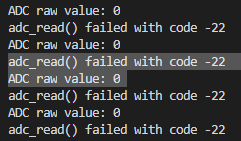I'm working on the nrf5340 with a modified sample found here (main.c of the base sample here) and nrf connect sdk 1.7.1
I see that adc_sequence_options .interval_us can set the time between samples in microseconds, so I tried to use that to set my sampling rate like so:
const struct adc_sequence_options sequence_opts = {
.interval_us = 17, // 17 us between 1000 samples
.callback = NULL,
.user_data = NULL,
.extra_samplings = BUFFER_SIZE - 1,
};
, but the board prints Error in adc sampling: -16.
Is there a way to either resolve my interval_us bug or another way to configure the sampling rate?
Thanks




